The Essential Guide to Body Fluid Cleanup Procedures
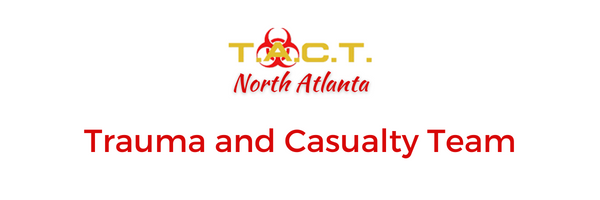
The Essential Guide to Blood and Body Fluid Remediation Procedures

The Essential Guide to Body Fluid Cleanup Procedures
When dealing with a situation that involves exposure to blood and body fluids or a crime scene cleaning scenario, knowing the correct cleanup procedure is crucial to ensure everyone’s safety. Blood and body fluids present a primary risk of disease transmission, making proper handling essential. Bodily fluids can harbor a wide range of pathogens, including Hepatitis B, Hepatitis C, Human Immunodeficiency Virus (HIV), Norovirus, Salmonella, and E. coli.
Effective cleanup isn’t just about hygiene; it’s a question of health and emotional well-being, particularly in the most traumatic scenarios. Proper bodily fluid cleanup is critical, as many different diseases are transmitted via bodily fluids. Here’s an in-depth guide on handling such delicate tasks, whether you’re a first responder, homeowner, renter, property manager, or police officer.
The remediation process must be performed by designated and trained personnel to ensure safety and compliance with legal standards.
Understanding the Risks
Exposure to body fluids can pose significant health risks due to potential pathogens such as viruses, bacteria, and fungi. Direct contact with contaminated materials or surfaces increases the risk of pathogen transmission. These can include bloodborne pathogens like hepatitis and HIV, necessitating a thorough and professional approach to cleanup. Always prioritize personal protection by using gloves, masks, and eye protection. If possible, also use disposable gowns to cover any exposed skin. It is essential to use all required PPE—such as gloves, masks, eye protection, gowns, and shoe covers—to prevent contamination and minimize exposure to pathogens.
The risk of transmission is especially high in environments where people are in close proximity, such as healthcare settings, schools, and workplaces. The OSHA Bloodborne Pathogens Standard mandates specific cleaning procedures to ensure compliance.
The Cleanup Process
For many incidents involving blood or other potentially infectious materials, it is safest to rely on professional biohazard cleanup servicesbiohazard cleaning services rather than attempting remediation alone.
The first step in the cleanup process is an initial assessment, which involves identifying the type of fluid present and evaluating the level of contamination. This includes determining whether there are any visible signs of blood or other bodily fluids, as well as assessing the severity of the spill. During the initial assessment, professionals also identify hazards and plan appropriate safety and remediation procedures. Specialized equipment needed for safe and effective cleanup—such as personal protective gear, biohazard disposal containers, and testing instruments—is essential to ensure thorough disinfection and compliance with safety standards. Immediate containment of the affected area is a best practice for blood and body fluid remediation to prevent further spread of contaminants. If an area is heavily contaminated or if
Documentation of the cleanup process is often necessary in professional settings to ensure compliance and provide records of proper remediation.
Step-by-Step Cleanup Procedure
These general steps can help you understand what professional biohazard cleanup companiesblood and trauma cleaning in North Atlanta typically involves and why trained experts are often necessary.
Ensure Safety: Before beginning spill cleanup or blood cleanup procedures, ensure the scene is safe and that there’s no risk of injury or infection. Wear appropriate PPE, including nitrile gloves, goggles, masks, and disposable gowns, to safely clean and prevent exposure to pathogens.
Containment: Limit the affected area to prevent cross-contamination. Use physical barriers such as plastic sheeting to partition off the area from uncontaminated spaces during blood spill or bodily fluid remediation.
Initial Cleanup: Remove larger pieces of debris. Carefully collect sharp objects like broken glass or needles, ensuring they don’t puncture cleanup materials. Use absorbent materials such as pads, disposable towels, or paper towels to soak up blood and body fluids immediately after a spill. Always wear disposable gloves during this process to safely clean and prevent contamination.
Disinfection: Apply an appropriate disinfectant, such as one containing bleach, to all affected areas to disinfect and eliminate pathogens. Follow product instructions for correct application and necessary contact time to ensure thorough decontamination.
After applying disinfectant, allow all surfaces to air dry to maximize pathogen elimination.
Deep Cleaning: Scrub surfaces to remove all traces of contaminants. For large spills, use a wet vacuum designed for biohazard cleanup. Cleaning blood spills on hard surfaces like tile, vinyl, or cement is generally easier than on porous materials such as carpets or drywall, which may require specialized techniques for effective removal.
Deodorization: Treat the area with a deodorizer to eliminate any residual odors that can be psychologically affective.
Waste Disposal: Dispose of all materials used in the cleanup, including gloves and absorbent pads, in biohazard bags or containers as biohazardous waste. Ensure proper labeling, containment, and adherence to regulations for safe disposal.
Final Inspection: Perform a meticulous inspection to guarantee that no trace of the incident remains. Verification of pathogen removal can be conducted using ATP testing or UV light.
Restoration: In some cases, structural restoration may be necessary to return the property to its pre-incident condition.
After completing the cleanup, always wash your hands thoroughly with soap and water for at least 20 seconds to ensure safety.
Prevention of Bloodborne Pathogens
Preventing the spread of bloodborne pathogens is essential for maintaining a safe environment wherever bodily fluids may be present—whether in workplaces, schools, or public spaces. Bloodborne pathogens, such as hepatitis B, hepatitis C, and HIV, can pose a significant risk if proper safety protocols are not followed during exposure to blood and other body fluids.
To minimize the risk of transmission, it is important to implement comprehensive safety measures. This includes providing training for staff and occupants on how to recognize and respond to incidents involving bodily fluids. Ensuring that personal protective equipment (PPE) such as gloves, masks, and eye protection is readily available and used correctly is a fundamental step in reducing exposure to potentially infectious materials.
Regularly reviewing and updating safety protocols helps keep everyone informed about the latest best practices for handling fluids and contaminated surfaces. Immediate cleanup of spills, using appropriate disinfectants, and safely disposing of contaminated materials are critical actions that prevent further contamination and protect against the spread of pathogens.
By fostering a culture of safety and preparedness, organizations and individuals can significantly reduce the risk of bloodborne pathogen exposure and create a healthier, more secure environment for all.
When to Call the Professionals
Depending on the severity of the situation, you might need to enlist the help of professional cleanup services, as cleanup must only be performed by designated and trained personnel to ensure safety and compliance. This could include a professional crime scene cleaning service24/7 emergency biohazard, hoarding and crime scene cleaning service in Atlanta, or other specialized emergency vehicle decontamination servicesbiohazard cleaning services near you.
Depending on the severity of the situation, you might need to enlist the help of a professional cleanup service like T.A.C.T. North Atlanta’s 24/7 emergency biohazard cleanup in Marietta, Georgia24/7 emergency biohazard cleanup in Atlanta, Georgia from T.A.C.T. North Atlanta, which specializes in sensitive scenarios such as suicide cleanup, undiscovered deaths, crime scenes, and other biohazard conditions. The services offered include but are not limited to:
Blood Spills
Odor Removal
Mold Remediation
Rodent Droppings
Emergency Vehicle Decontamination
Professional cleanup services ensure the remediation process is handled correctly and properly, following strict protocols and testing methods to confirm all contaminants and pathogens are cleared. These services comply with OSHA guidelines and local regulations for the disposal of biohazardous waste, often requiring licensed medical waste disposal services. Professional teams are equipped to handle hazardous materials safely while also being trained to act with empathy and discretion during these distressing times for those involved. In particular, crime scene cleanup servicescrime scene cleaning services in North Atlanta and broader crime scene cleanup cost considerationsemergency biohazard, trauma, and COVID-19 cleaning services can address complex contamination issues that go beyond visible body fluids, while dedicated biohazard and blood cleanup services after a deathpost-mortem home care cleaning after death helps families restore a safe, livable environment following a loss.
The remediation process is designed to protect both cleanup personnel and the general public from exposure to biohazards and bloodborne pathogens. Professional services have systems in place to comply with all relevant state and federal laws, helping clients avoid liability and ensuring all procedures are documented and performed according to legal standards.
T.A.C.T. North Atlanta's Protocol
For residents in the regions of Atlanta and its surroundings, T.A.C.T. North Atlanta offers a systematic approach:
Immediate Response: Contact T.A.C.T. to receive a swift and efficient response to your emergency.
Professional Arrival: Upon arrival, the skilled team assesses the situation and communicates a clear plan of action.
Thorough Execution: With efficiency and respect for those affected, T.A.C.T. performs the cleanup service meticulously. The team contains the affected area to prevent the spread of contamination to other areas, then cleans up all bodily fluids and removes any other hazardous materials that can't be disinfected or decontaminated.
Restoration to Normality: After cleanup, they ensure there are no lingering odors and work to restore your property to its original, safe condition, facilitating a step towards normalcy.
Ongoing Support: In case of further questions or concerns, T.A.C.T. provides support even after the job is done.
Areas Served
T.A.C.T. North Atlanta serves various locations including:
Atlanta, GA
Buford, GA
DeKalb County, GA
Douglasville, GA
...and many more.
Getting Help
If you find yourself in need of their services, reach out via the T.A.C.T. North Atlanta contact page via the contact form, or call T.A.C.T. directly to set in motion a prompt response. For guidance on what you should do after a death in Atlanta, including suicide cleanup and legal considerations, T.A.C.T. North Atlanta also provides detailed resources. Post-service, consider leaving a review on Google or Facebook to share your experience.
Handling body fluids with proper precautions and protocols is a matter of public health and personal well-being. If the task is beyond your comfort or capacity, remember that professional services like T.A.C.T. North Atlanta are equipped to assist with empathy and expertise, returning your space to safety and serenity.
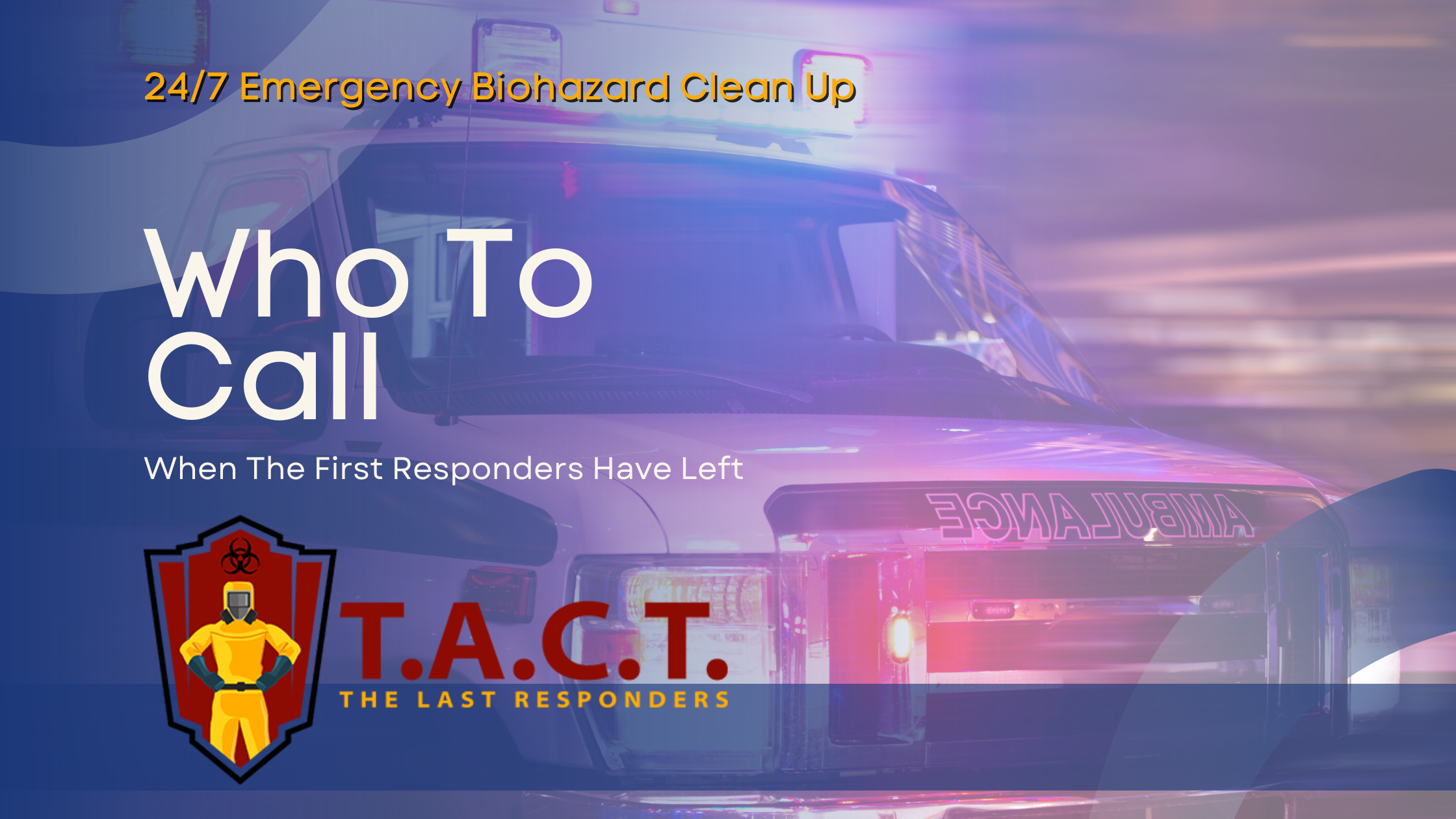
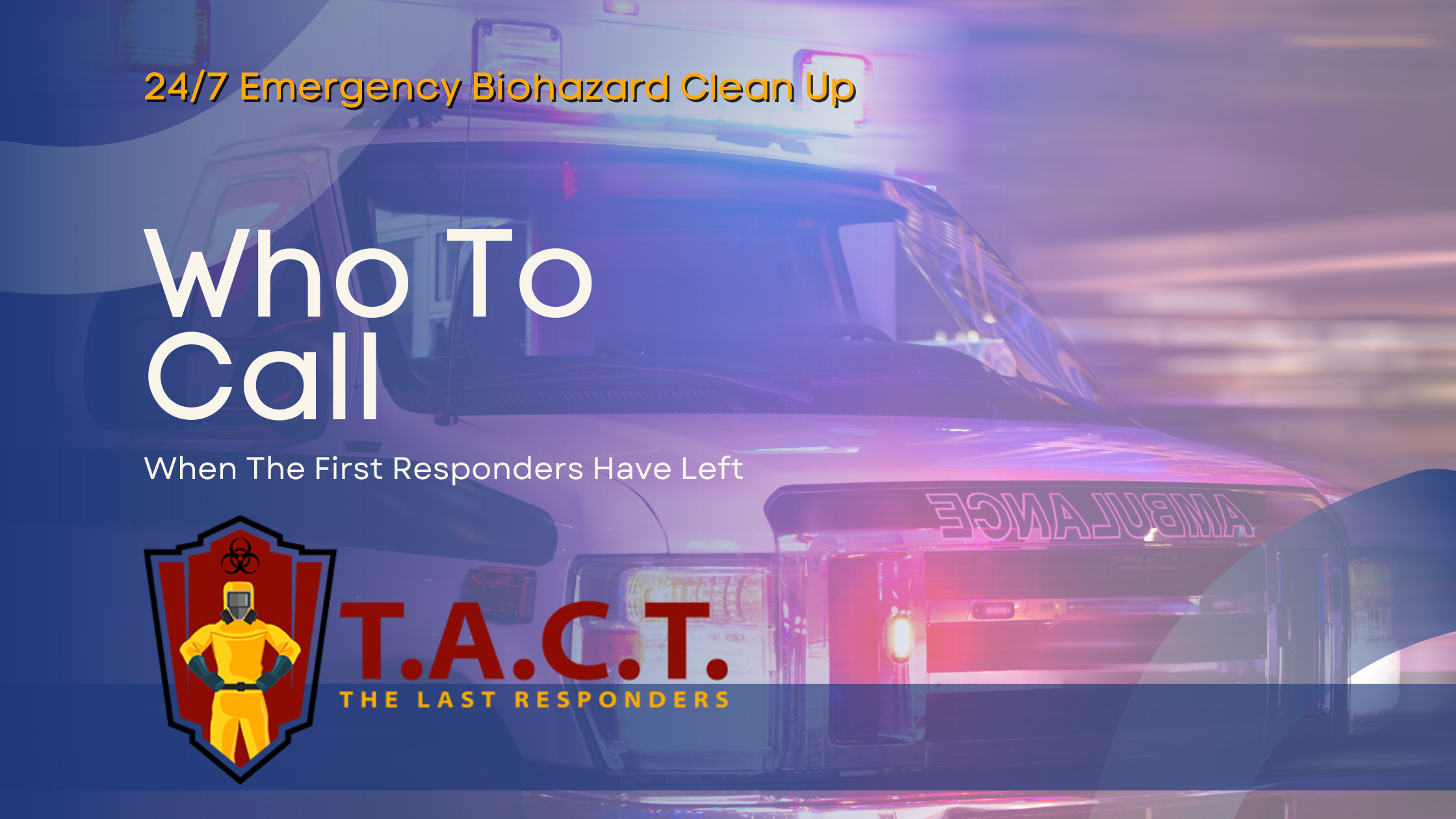
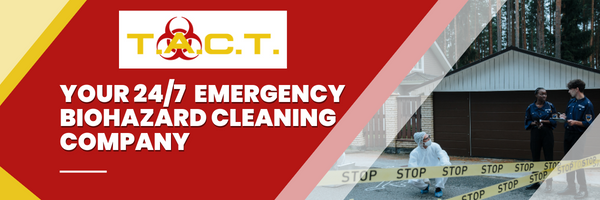

The Essential Guide to Body Fluid Cleanup Procedures
Latest news
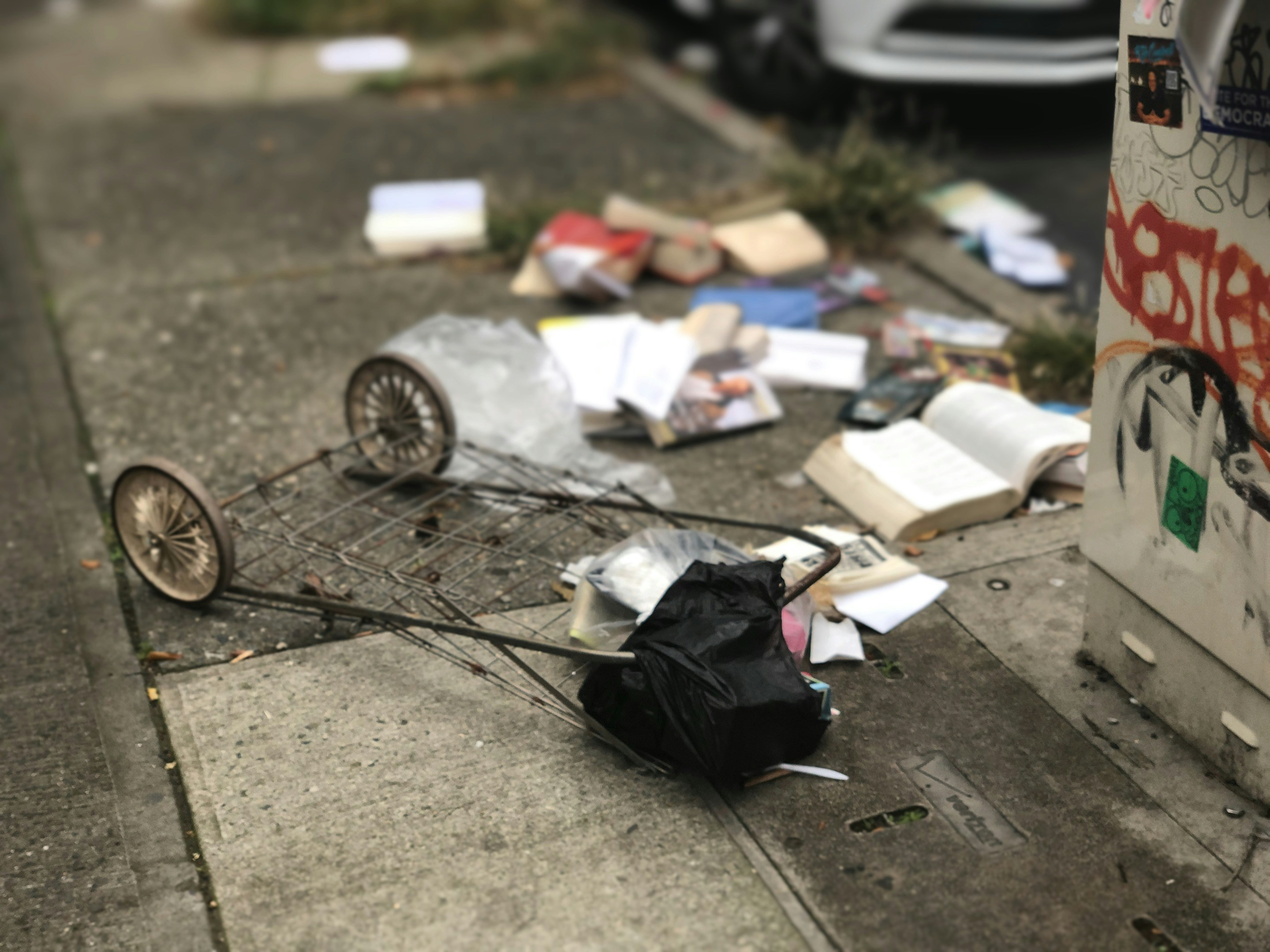
Delve into the essential stages of trauma scene cleanup in Atlanta, GA, providing insights into professional practices that ensure thorough restoration.
Read More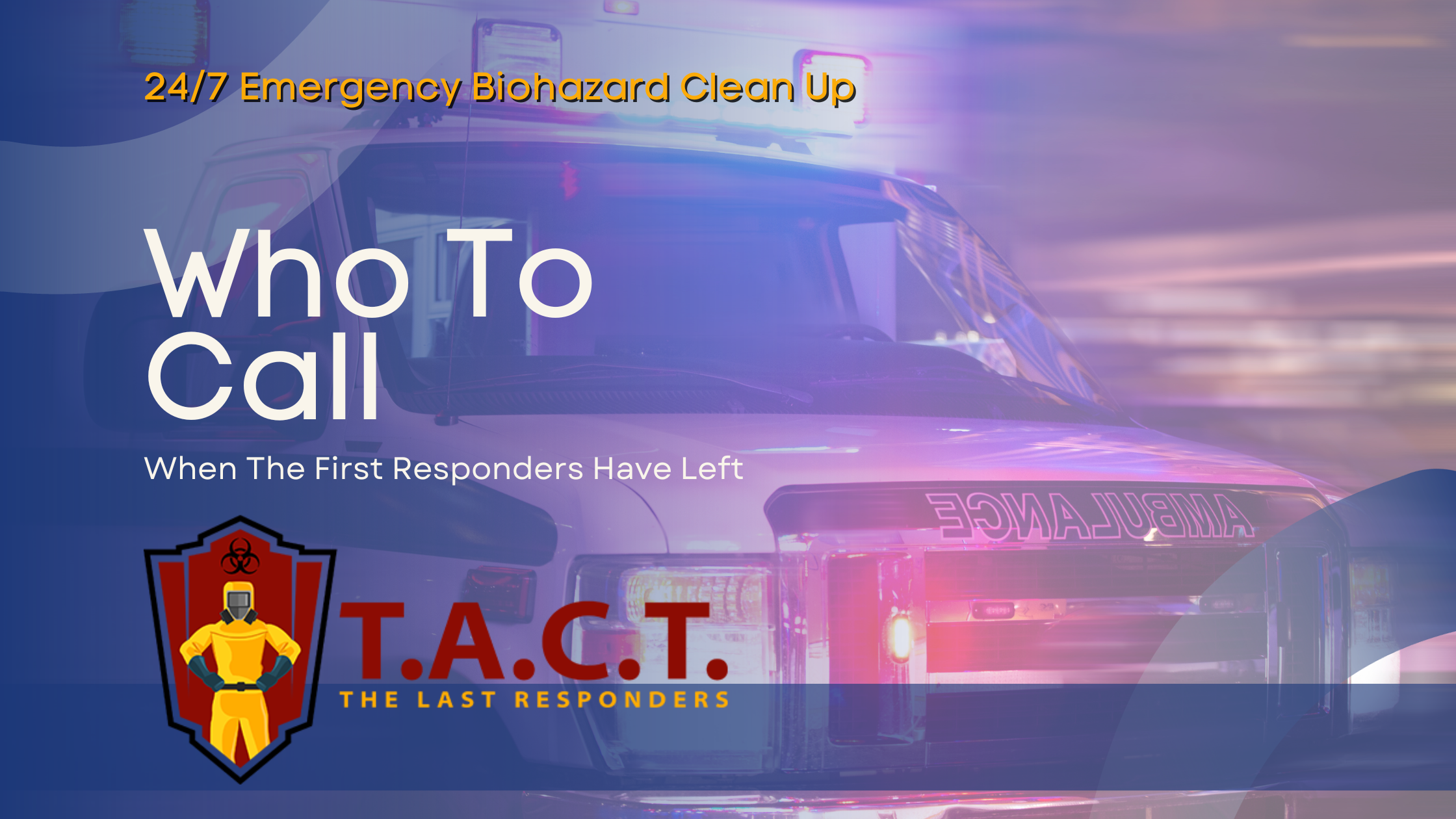
Learn why professional biohazard cleanup in Atlanta is crucial for safety. Discover the risks of DIY cleanup and the benefits of hiring certified experts.
Read More